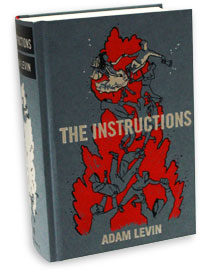Read This: The Instructions
 I’ve got another review at Shelf Awareness this morning, in which I express great enthusiasm for Adam Levin’s debut novel, The Instructions. it’s well over a thousand pages long, but it’s totally worth it. Imagine if the perpetrators of the massacre at Columbine had been religious zealots who’d studied counterinsurgency tactics, and you’ve come a little bit towards understanding Gideon Maccabee, a 10-year-old boy genius stuck in “The Cage,” the room where his junior high school sticks all its troubled or dangerous students, and the four days in which he gathers his classmates together as “The Side of Damage” and wreaks utter and total havoc. As I told Shelf Awareness readers, Gideon’s voice is a bit like a 21st-century A Clockwork Orange, but with some strong influence from George Saunders—I’m thinking here especially of the way in which Saunders invests absurd situations with emotional authenticity. (Somebody’s going to mention Chuck Palahniuk, too, and Levin’s totally anticipated that.) It’s a profoundly disturbing novel, all the more so perhaps for being one of the smartest novels I’ve read this year.
I’ve got another review at Shelf Awareness this morning, in which I express great enthusiasm for Adam Levin’s debut novel, The Instructions. it’s well over a thousand pages long, but it’s totally worth it. Imagine if the perpetrators of the massacre at Columbine had been religious zealots who’d studied counterinsurgency tactics, and you’ve come a little bit towards understanding Gideon Maccabee, a 10-year-old boy genius stuck in “The Cage,” the room where his junior high school sticks all its troubled or dangerous students, and the four days in which he gathers his classmates together as “The Side of Damage” and wreaks utter and total havoc. As I told Shelf Awareness readers, Gideon’s voice is a bit like a 21st-century A Clockwork Orange, but with some strong influence from George Saunders—I’m thinking here especially of the way in which Saunders invests absurd situations with emotional authenticity. (Somebody’s going to mention Chuck Palahniuk, too, and Levin’s totally anticipated that.) It’s a profoundly disturbing novel, all the more so perhaps for being one of the smartest novels I’ve read this year.
And The Instructions is already shaping up to be one of those novels that divides literary critics. Maud Newton was impressed, describing it as “dark, funny, and deeply provocative,” while Joshua Cohen dismissed it as “a very long joke: a setup that lacks a punch line.” There’s a twist to Cohen’s review, though, and he lays the issue out in his opening line: “Who better to review a 1,000-page Jewish book that comes out in the fall than the author of an 800-page Jewish book that came out in the spring?” (I haven’t read Witz yet, but I do have it out on my bookcase where I can see it, daring me.) Well, some people might be able to think of several better candidates; as Jason Diamond observed in Jewcy:
“What bothers me is the ethics question: Cohen obviously has a stake in all this, so was it fair to let him review Levin’s book? Wouldn’t another critic have been more appropriate to tackle The Instructions? Maybe a critic shouldn’t be able to come out and try to essentially advertise his own book in one of the most respected forums around. To put it in really simple terms: It’s almost like they let the author of Twilight review the Vampire Diaries.”
My own take? The New York Times Book Review knew exactly what it was doing when it selected Cohen to review Levin, and my suspicion is that they were hoping to generate exactly the sort of “controversy” that has indeed taken place. I’ve long believed that the NYTBR deliberately sets out to gin up literary controversies perhaps under the misguided assumption that being the only newspaper book review section that people still talk about is the same thing as being the only newspaper book review section that matters. In this specific case, I think Cohen is wrong, and wrong in a very simplistic way—by reducing the voice of The Instructions to a “unseemly and disastrous” imitation of David Foster Wallace (“Levin’s tutelary goy”), Cohen misses out on all the other elements I mentioned above. His attempt to dismiss The Instructions as “the Jewish novel you’ll never finish” will, I hope, prove to be a failure.
11 November 2010 | read this, theory |

 Our Endless and Proper Work is my new book with Belt Publishing about starting (and sticking to) a productive writing practice.
Our Endless and Proper Work is my new book with Belt Publishing about starting (and sticking to) a productive writing practice. 
